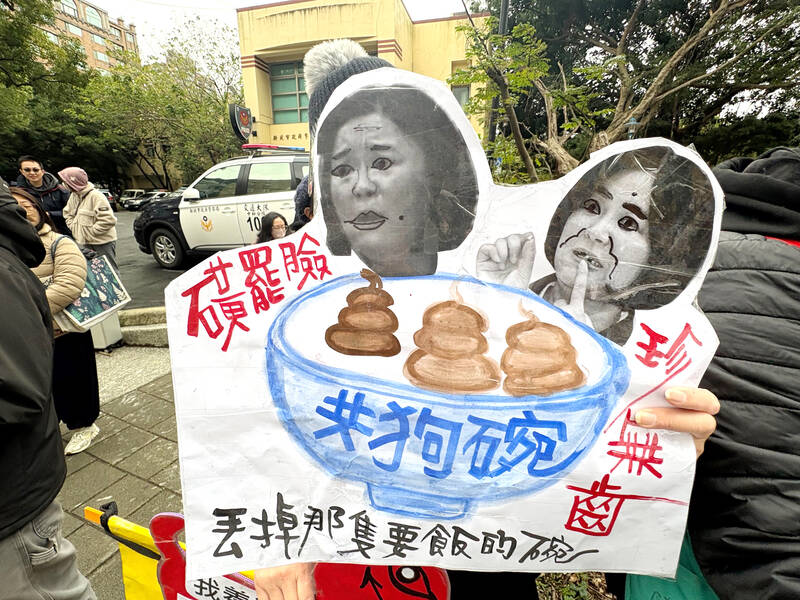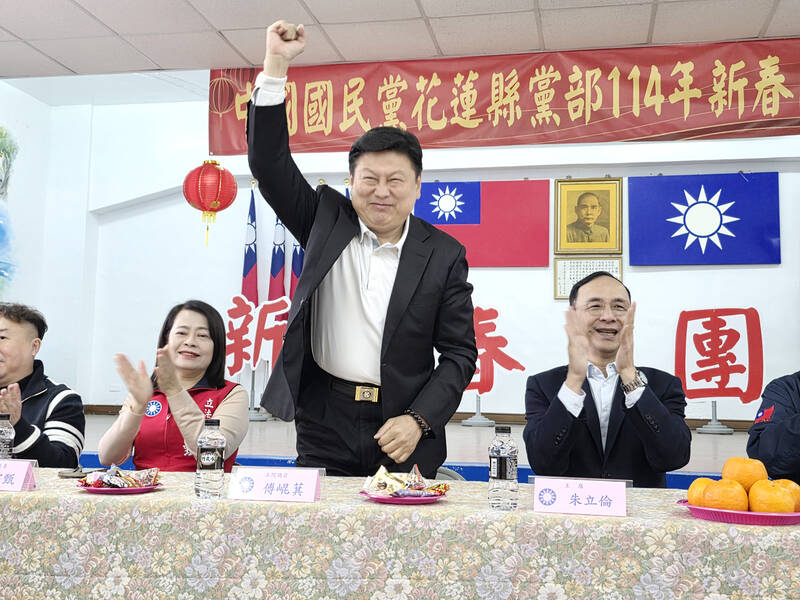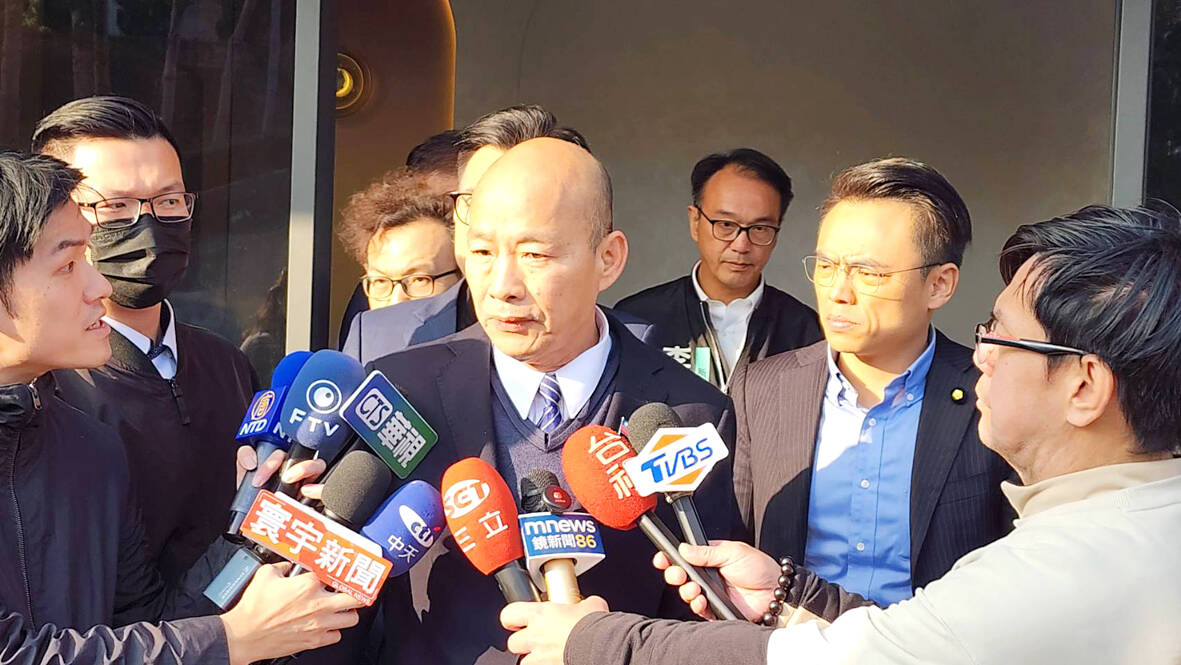Chinese Nationalist Party (KMT) legislative caucus convener Fu Kun-chi (傅?萁) and some in the deep blue camp seem determined to ensure many of the recall campaigns against their lawmakers succeed. Widely known as the “King of Hualien,” Fu also appears to have become the king of the KMT.
In theory, Legislative Speaker Han Kuo-yu (韓國瑜) outranks him, but Han is supposed to be even-handed in negotiations between party caucuses — the Democratic Progressive Party (DPP) says he is not — and Fu has been outright ignoring Han. Party Chairman Eric Chu (朱立倫) isn’t taking the lead on anything while Fu appears to be in charge of the party’s agenda.
Recently while trying to get both sides back to the negotiating table, Han appeared to confirm this is the case when he essentially threw up his hands and said to the pan-green side “Oh! ‘Little Fu’ (‘little’ being an endearment indicating friendship) is really big now.” Han expressed frustration when he negotiated a cross-caucus negotiation on the budget on Tuesday last week and Fu did not even bother to show up.

Photo: Chen Yi-hsun, Taipei Times
Instead, Fu flew to Hong Kong for a travel show to promote Hualien on behalf of the government. According to a SETN News report, he then joined a dinner that included Hong Kong city councilors close to the Chinese Communist Party (CCP) and China’s United Front Work Department (UFWD).
Upon returning the same evening, at Hualian Airport a man repeatedly shouted at him “Chinese Communist running dog, Fu Kun-chi!”
‘THE FOUR KMT HORSEWOMEN’

Photo: Hua Meng-ching, Taipei Times
Fu and others in the party are going out of their way to double down on convincing voters that they are working to paralyze the government for political gain, undermine the constitution, weaken national defense and work for the CCP over the interests of Taiwanese people. Fu’s choices last Tuesday are very emblematic.
Similarly, other lawmakers like the “Four KMT Horsewomen of the Constitutional Apocalypse” of Jennifer Chen (陳玉珍), Hsu Chiao-hsin (徐巧芯), Weng Hsiao-ling (翁曉玲) and Ma Wen-chun (馬文君) are frequently in the news for pro-China statements, attacking the military budget, promoting Chinese identity and in Ma’s case playing fast and loose with national secrets on Taiwan’s indigenous submarine program.
Chen has been so forceful that the press refers to her as “Kinmen tank (金門坦克),” while Hsu likens herself to a honey badger because they are “vicious and merciless” (心狠手辣), proudly describes herself as an “evil woman” (惡女) and is famous for digging up dirt to smear opponents.

Photo: Tsai Chang-sheng, Liberty Times
High-ranking KMT politicians like Chu, New Taipei Mayor Hou Yu-ih (侯友宜) and Taichung Mayor Lu Shiow-yen (盧秀燕) all know this turns off voters. It also adds fuel to the recall campaigns that 35 against KMT caucus lawmakers look set to reach stage two, versus only 17 against Democratic Progressive Party (DPP) legislators. Speaker Han is also well aware of this, as he was successfully recalled as Kaohsiung mayor by a similar pan-green movement.
Why is Fu and his allies intentionally creating the fear and outrage that boosts the recall campaigns chances of success?
It appears there is not any electoral strategy at all, and the power struggle with the DPP administration has consumed them. Perhaps they assume voters will forget everything in a few months.
There is an ideological Chinese identity element guiding their behavior. Chen is from Kinmen and is unambiguously Chinese, and blasted huge holes in the Ministry of Culture budget because she is firmly against anything promoting Taiwanese identity.
In Hsu’s case she also personally thrives on creating outrage and controversy.
Recently Taiwan People’s Party (TPP) Chairman Huang Kuo-chang (黃國昌) has been touting his party as pro-Taiwan, but in practice is supporting the KMT’s Chinese identity politics. It is telling that he has also recently started sporting a Republic of China lapel pin of the type popular with KMT politicians.
THE DPP’S STRATEGY
They are providing so much ammunition to the recall campaigns that it makes it easy for the DPP to help nudge them along — though officially they have no role.
While many of the cuts and frozen portions of the budget are real and painful, they do not “paralyze” the government as much as they say. It appears even Fu and the KMT knew if they totally paralyzed the government would be political suicide, but they are hobbling the DPP administration.
This is supported by split-screen messaging by the administration. On one hand bemoaning the budget cuts, while on the other announcing all sorts of new spending.
There is a constitutional crisis brewing, most clearly evidenced by the KMT eviscerating the Constitutional Court, but also its cutting necessary defense spending, ravaging the Ministry of Culture and engaging in some very alarming CCP-friendly behavior.
The Lai administration just decertified three Chinese universities connected to the UFWD, including what was said to be Fu’s alma mater Jinan University — though he now says he only studied there for a few months and did not actually graduate. This should have been done years ago, but the timing does look intentional to raise suspicions further about Fu.
PAST BEHAVIOR, FUTURE RECALL?
Fu, “The Four KMT Horsewomen” and others like them are also running another risk — they are generating a lot of negative attention and in many cases outright hostility. Historically, the recall votes that have succeeded have all been of people who offended a lot of people.
Former Taiwan Statebuilding Party Legislator Chen Po-wei (陳柏惟) was famously provocative, pugnacious and liked legislative brawling, while Taoyuan City Councilor Wang Hao-yu (王浩宇) of the DPP was a famously nasty online personality towards pan-blues and loved generating controversy. Both were recalled.
In spite of being in a blue district, Independent Legislator Freddy Lim’s (林昶佐) recall failed despite being a deep green, left-wing politician. He had a friendly, cooperative attitude, showed genuine concern for his constituents and was hard to dislike.
Similarly, then-independent Kaohsiung City Councilor Huang Jie (黃捷) was a friendly personality — in spite of a famous mocking eye-rolling incident against then-Mayor Han — and she survived her recall.
Jennifer Chen is in one of the deepest blue constituencies and the stage one recall campaign against her came up short by a few dozen votes, while Weng Hsiao-ling is a party list legislator and therefore safe.
Of the politicians highlighted in this column, the other three are in pan-blue-leaning districts but are at risk. Fu Kun-chi won his district with 53.8 percent of the votes, Ma Wen-chun with 53.1 and Hsu Chiao-hsin with 52.6 percent.
This is a national movement motivated by outrage and fear — if it continues to the actual recall votes — will also likely boost turnout. A recent Mirror Media poll found that 78.3 percent plan to vote in the recalls, and in almost all districts the DPP had easily won more than a quarter of the votes — usually more than 40 percent.
Fu, “The Four KMT Horsewomen” and others like them should be very nervous because their combative personalities and the scandals in their past have made them a lot of enemies. With the low recall threshold all that is required is that more disgruntled people come out and vote “yes” and that they are at least 25 percent of the district electorate.
Once ousted in a recall, they cannot run in the subsequent by-election.
This year is going to be a wild ride.
Donovan’s Deep Dives is a regular column by Courtney Donovan Smith (石東文) who writes in-depth analysis on everything about Taiwan’s political scene and geopolitics. Donovan is also the central Taiwan correspondent at ICRT FM100 Radio News, co-publisher of Compass Magazine, co-founder Taiwan Report (report.tw) and former chair of the Taichung American Chamber of Commerce. Follow him on X: @donovan_smith.

Taiwan has next to no political engagement in Myanmar, either with the ruling military junta nor the dozens of armed groups who’ve in the last five years taken over around two-thirds of the nation’s territory in a sprawling, patchwork civil war. But early last month, the leader of one relatively minor Burmese revolutionary faction, General Nerdah Bomya, who is also an alleged war criminal, made a low key visit to Taipei, where he met with a member of President William Lai’s (賴清德) staff, a retired Taiwanese military official and several academics. “I feel like Taiwan is a good example of

March 2 to March 8 Gunfire rang out along the shore of the frontline island of Lieyu (烈嶼) on a foggy afternoon on March 7, 1987. By the time it was over, about 20 unarmed Vietnamese refugees — men, women, elderly and children — were dead. They were hastily buried, followed by decades of silence. Months later, opposition politicians and journalists tried to uncover what had happened, but conflicting accounts only deepened the confusion. One version suggested that government troops had mistakenly killed their own operatives attempting to return home from Vietnam. The military maintained that the

Jacques Poissant’s suffering stopped the day he asked his daughter if it would be “cowardly to ask to be helped to die.” The retired Canadian insurance adviser was 93, and “was wasting away” after a long battle with prostate cancer. “He no longer had any zest for life,” Josee Poissant said. Last year her mother made the same choice at 96 when she realized she would not be getting out of hospital. She died surrounded by her children and their partners listening to the music she loved. “She was at peace. She sang until she went to sleep.” Josee Poissant remembers it as a beautiful

Before the last section of the round-the-island railway was electrified, one old blue train still chugged back and forth between Pingtung County’s Fangliao (枋寮) and Taitung (台東) stations once a day. It was so slow, was so hot (it had no air conditioning) and covered such a short distance, that the low fare still failed to attract many riders. This relic of the past was finally retired when the South Link Line was fully electrified on Dec. 23, 2020. A wave of nostalgia surrounded the termination of the Ordinary Train service, as these train carriages had been in use for decades